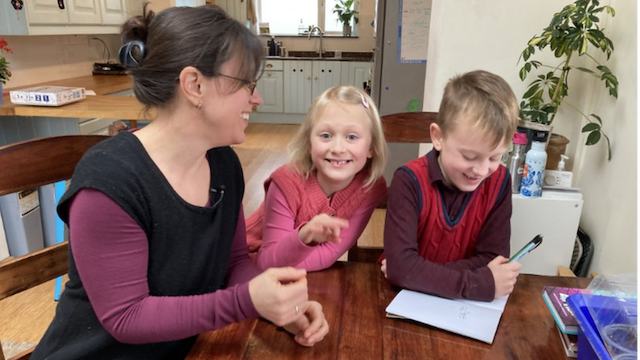~ Introduction ~
What is most interesting about the following column is – that this is NOT about the U.S.A. So isn’t it interesting that there are those in the U.K. that also get it. Enjoy the lesson my friends. ~ Jeffrey Bennett, Editor

Many parents like Susanne Willdig have chosen to home school their children
The number of parents choosing to home educate their children is increasing in the West, figures show.
Four times more children in Wiltshire and Somerset are being home-schooled than in 2013.
In Gloucestershire it has risen by 15 per cent since 2021 during the Covid19 pandemic. Susanne Willdig, from Bristol, home schools her children and said: “I am able to tailor their education to them.”
“I have two [children]. But [if you are a school] you just cannot manage a 30-children classroom and really individually tailor what you are doing for each child,” she added.
“It’s just not possible.”
‘My kids are living in the real world’
Despite her children not going out to school and mixing with others in class, Susanne feels it is actually other people’s children who are “missing out”.
“My kids are living out in the world, they are living in the real world, which I often see school children just learning about from outside it.”
While home schooling is a personal choice for Mrs Willdig, for some parents they believe home education can be a necessity.

Naomi Campbell said mainstream school would be “difficult” for her son
Naomi Campbell, another Bristol parent, teaches her 13-year-old son Seb at home because she thinks home schooling better suits his needs.
He has Attention Deficit Disorder (ADHD) and struggled at school.
“Mainstream school for Seb would have been really difficult for all of us as a family,” Mrs Campbell said.
“From a really young age we were aware that Seb was a bit different…fast forward eight years we know he is neurodivergent.
“Mainstream school just wouldn’t have been able to meet his needs. He likes to chat, he likes to move and can’t keep still in a classroom.
“He’s very inquisitive and would find it hard to be quiet in a classroom, not shout out when he knows the answers to things.
“He would have been labelled the disrupter, the naughty child.”

Seb is among the thousands of children being educated at home by their parents
For the last 10 years councils across the West of England have seen the number of pupils home schooled increase by three and sometimes four times.
The surge in the number of children being taught at home in the West reflects a growing trend nationally.
Cabinet Member for Children’s Services, Education and Skills at Wiltshire Council, Councillor Laura Mayes, said it could be hard for parents to find the right school for their child if there are additional needs.
“We can’t always do it immediately so I think there are those parents who are choosing to home educate their child because they think that is absolutely the best and right thing to do.
“There are others who are struggling to find the right place for their child and are therefore home educating them for that reason.”
Councillor Paul May, cabinet member for Children’s Services at Bath and North East Somerset Council (BANES), said: “The council supports all children and young people in B&NES in education, whether learning in school or at home.
“We visit families annually to monitor the quality of the education and produce a report which is shared with parents.
“Should any actions be needed then a clear timescale is put in place, as well as a further visit.”
In a statement, a Department for Education spokesperson said: “We support the right of parents to educate their children at home, but all children should receive a suitable education regardless of where they are educated.”
Written by Alastair McKee and Rhiannon Yhnell for BBC News ~ February 28, 2024
